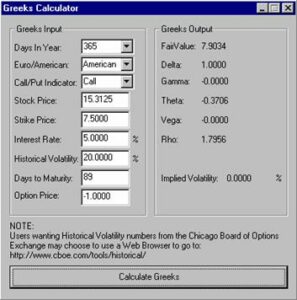Greeks Help
DTN_IQ Option Chains displays Greeks, which are calculations based on the underlying stock price, the option price, and the expiration date using the Black-Scholes Method. You can use Greeks to create risk free portfolios and help guess the future behavior of an option. You can also use them to guess the theoretical fair market value of an option versus the actual market value.
The Greek parameters delta, theta, rho, gamma, and vega measure option price sensitivity to changes in the price of the underlying stock, time to the option’s expiration, prevalent interest rates, and underlying stock price volatility.
- Delta
- Measure of the option price sensitivity to changes of the underlying stock price. The gain (loss) of the option price roughly equals delta times increase (decrease) of the stock price, provided the other parameters (time to expiration, interest rate, and volatility) are fixed.Mathematically: First partial derivative of the option price with respect to the underlying stock price.
- Theta
- Measure of the option price sensitivity to the passage of time. Expected gain (loss) of the option price during a period of time roughly equals theta times this period, provided that during the time period other parameters (stock price, interest rate, and volatility) are fixed.Mathematically: First partial derivative of the option price with respect to the time to expiration.
- Rho
- Measure of the option price sensitivity to changes of this parameter. Expected gain (loss) of the option price roughly equals rho times the increase (decrease) in interest rate, provided other parameters (stock price, time to expiration, and volatility) are fixed.Mathematically: First partial derivative of the option price with respect to the interest rates
- Vega
- Measure of the option price sensitivity to changes of this parameter. Expected gain (loss) of the option price roughly equals vega times the increase (decrease) of volatility, provided other parameters (stock price, time to expiration, and interest rates) are fixed.Mathematically: First partial derivative of the option price with respect to volatility.
- Gamma
- Measure of the delta sensitivity to changes of the underlying stock price. Gain (loss) of the option’s delta roughly equals gamma times increase (decrease) of the stock price. Gamma is normally used in relatively complicated trading strategies.Mathematically: First partial derivative of delta (i.e., second partial derivative of the option price) with respect to the underlying stock price.
To customize how Greek data are displayed:
- Click on the Settings icon.

Or
From the right mouse menu, select Settings.
The Settings dialog box appears.
- Click on the Greeks tab.
- Select an option for when to calculate Greeks:
- On request
- Every time stock price or option price changes
- Every specified number of minutes
Enter the number of minutes
- Enter the required data for calculations:
- Interest rate
- Historical volatility – 30-Day Volatility is automatically populated for equities
Tip: You can change the historical volatility at any time by entering the value in the Historical Volatility box on the right side of the Option Chains toolbar.
- Select American or European style of calculations.
Note: European options can be exercised only at the expiration date of the option. American options can be exercised at any time during the life of the option.
- Indicate the number of days in the year: 365 (calendar year) or 253 (market days).
Note: The selection affects the Black Scholes calculations.
- Click on OK.
To calculate Greek data:
- Display Option Chains data for a selected symbol.
- Double-click on a row of data.
The Greeks Calculator appears.
- Accept the Greeks input data or enter revised data.
- Click on Calculate Greeks.
The system calculates the Greeks and displays the output data.
- Close the Greek Calculator.
Tip: From the Settings dialog box you can specify how frequently the Greeks are calculated: on request, every time the stock price, option price changes, or every specified number of minutes.
The following data are used to calculate Greeks. You can accept the default data or enter different data.
- Days in Year: 365 or 253
- Euro/American: American or European
- Call/Put Indicator: Call or Put
- Stock Price
- Strike Price
- Interest Rate in %
- 30-Day Historical Volatility in %
- Days to Maturity
- Option Price
Note: You can change the default data for days in year, European or American calculation, interest rate, or historical volatility on the Settings dialog box.
Sample Greeks Calculator

To recalculate Greek data:
- Display Option Chains data for a selected symbol.
- Click on the Recalculate Greeks icon.

The system recalculates all the Greek data for the selected symbol.